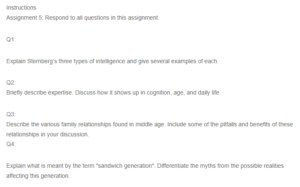Life Span
Human life span development is known to be how humans learn, mature, and adapt to the elderly phase of life from the infancy and adulthood stages. Several fields in psychology mainly focus on human thoughts, behavior, and emotion, but lifespan development mainly deals with the developmental changes one experiences from an infant age to aging and dying. The lifespan development in humans is evident in several ways, such as physically changing in height, emotions, and behavior as well. As a result, development psychologists focus on understanding the causes of these changes and the factors that do not change.
Sternberg’s Three Types of Intelligence
Robert Sternberg felt that intelligence was more than simply doing well in tasks such as exams and suggested that intelligence relied on one’s ability to adapt to their environment and adjust to it (The National Research Center on the Gifted and Talented, 2002). Sternberg came up with a theory now known as the Triarchic Theory that focuses on the ability to be successful in life and suggests that the three components, namely practical, creative and analytic intelligence, contribute to intelligent behavior (Sigelman & Rider, 2022). Creative intelligence involves the ability to develop new ideas and solutions to a problem or find a solution to an unexpected problem and can be categorized into novelty and automation. For example, when hiking with friends and someone’s backpack tears, whoever finds a creative solution to carry it or fix it easily will be considered the most creatively intelligent.
Practical intelligence is termed as individuals being street smart and having the capability to be able to apply their abilities to the kind of problems they experience. An example is when a car buyer uses their knowledge to choose the best car that is most favorable to their lifestyle instead of asking a car salesperson for advice. Lastly, analytical intelligence is mostly related to solving academic problems by being able to analyze, judge, evaluate, compare and contrast. An example is a detective solving cases as they can distinguish between meaningful and non-meaningful information and analyze clues.
Expertise and How It Shows Up In Cognition, Age, and Daily Life
Expertise is a psychological process of becoming too good at something through experience and knowledge research in a particular field or program. Expertise shows up in cognition when one gains knowledge in a specific skill that has been practiced for a long period of time. For instance, when beginner boxers train for a particular period, they become good at it. Expertise shows up in age by how people gain the skills or knowledge to be perfect at something at a specific age and grow old doing it; they end up being experts and do not lose the skills after aging. Moreover, experts are able to retain their skills due to factors such as preserved differentiation, compensation, and selective maintenance (Horton et al., 2008).
Various Family Relationships Found In Middle Age and the Challenges And Benefits of These Relationships
Middle age relationships among people include looking for a long-term partner to start a family with through marriage and moving away from parents. As a result, middle age adults tend to move away from their parents. Some of the pitfalls include moving away from one’s current family, which involves limiting the relationship one has with their family so as to focus on the new family, which is, on the other hand, a benefit in itself.
The “Sandwich Generation” and Myths From the Possible Realities Affecting This Generation
A “Sandwich Generation” is a group of middle-aged adults who are mostly in their 30s and 40s and are responsible for caring for both aging parents and growing children. An assumption is that people in this age group are expected to take care of their parents, but in reality, the parents are already established and do not really need any help. Instead, they should be focusing on the upbringing of the children.
Conclusion
In summary, the life span explains the different stages of one’s life from birth to adulthood while discovering the behavior, knowledge gained, and the challenges faced as aging continues. It is an important procedure in human life and helps understand behavior.
References
J, R. (2000). Home: The National Research Center on the gifted and talented (1990-2013). The National Research Center on the Gifted and Talented 19902013. Retrieved November 18, 2022, from https://nrcgt.uconn.edu/.
Horton, S., Baker, J., & Schorer, J. (2008). Expertise and aging: Maintaining skills through the lifespan. European Review of Aging and Physical Activity, 5(2), 89–96. https://doi.org/10.1007/s11556-008-0034-5
Sigelman, C. K., & Rider, E. A. (2022). Life-span: Human development. Cengage Learning.
ORDER A PLAGIARISM-FREE PAPER HERE
We’ll write everything from scratch
Question

Life Span
Instructions
Assignment 5: Respond to all questions in this assignment.
Q1:
Explain Sternberg’s three types of intelligence and give several examples of each.
Q2:
Briefly describe expertise. Discuss how it shows up in cognition, age, and daily life.
Q3:
Describe the various family relationships found in middle age. Include some of the pitfalls and benefits of these relationships in your discussion.
Q4:
Explain what is meant by the term “sandwich generation”. Differentiate the myths from the possible realities affecting this generation.


